新编跨文化英语交际Unit4-01Language and Culture
新编跨文化交际英语教程答案详解
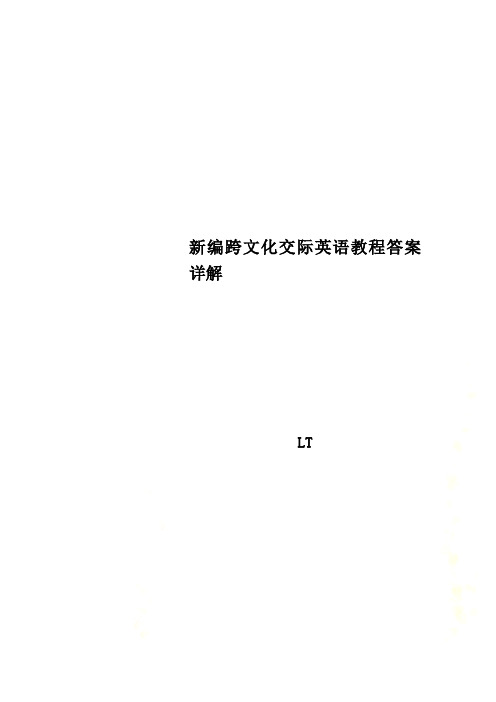
make up what is called ―culture‖ in the social sciences-the habits of everyday life, the cues to
live and communicate within that world. Culture teaches us how to behave in our life from the
instant of birth. It is omnipresent.
5. What are the major elements that directly influence our perception and communication?
which people respond, the automatic reactions they have to whatever they see and hear. These often
differ, and the differences may introduce misunderstandings where we seek understanding.
旨在通过课堂教学及相关活动使学生认识跨文化交际对当代世界所具有的重要意义和作用,
了解文化对人类生活各个方面、尤其是交际活动的制约和影响,理解并把握交际活动的重要
性、丰富性、复杂性,熟悉跨文化交际的基本构成以及所涉及的各种因素,培养跨文化意识,
形成和发展对文化差异的敏感和宽容、以及处理文化差异问题的灵活性,提高使用英语进行
跨文化交际Unit4
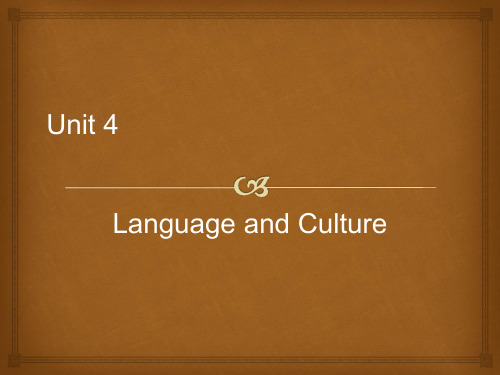
பைடு நூலகம்
More examples
“Why time flies?”
“Because somebody wants to kill it.” “你有什么了不起,能把我吃了!”
“不能,我是回民!” 外甥打灯笼照(舅)旧
Language = neutral codes and grammatical rules? We make cultural choices when we select words,
form sentences and send a message. All languages have social questions and information
as before; as usual; as of old 狗撵鸭子呱呱叫
very good
More examples
恋爱“三草”原则: 女:你说你很寂寞,为什么不去找你以前的女朋友而来追我
呢?
男:好马不吃回头草!(A good horse will never turn round to graze on an old pasture.)
meaning comes out of the context, the cultural usage.
Reading I How Is Language Related to Culture
Language reflects the environment in which we live. (snow, wine)
More examples
I am sorry. I am sorry, too. I am sorry three. What are you sorry for (four)? I am sorry five.
跨文化交际课件第四章语言与文化Language and culture概要1

Words different in denotation
Things or concepts are represented by one or perhaps two terms in one language, but by many more terms in the other language, i.e. finer distinctions exist inor Street Walking
It is said that in Rome, in front of a shoe store, there was such a sign to attract English-speaking customers: Shoes for street walking. Come in and have a fit. The sign caught the attention of many Englishspeaking tourists, but not to look at the shoes displayed in the windows, but to read the sign and then break out into laughter.
Case 3 A Misunderstanding Caused
by a Joke
Roger was the Personnel Executive of a large American multinational firm. In 1996, Roger was working in Brazil to help promote their business. One evening, there was a party, attended by both his employees from the United States and many Brazilian business people. At the party, Roger bumped into Rosalita, a Brazilian woman he had known for some time. Roger generally had a very good impression of Rosalita and always felt at ease with her, so that he felt free to tell jokes and share personal thoughts, and talk about Brazil and Brazilian life without having the jitters of offending Rosalita.
跨文化交际Unit 4课件
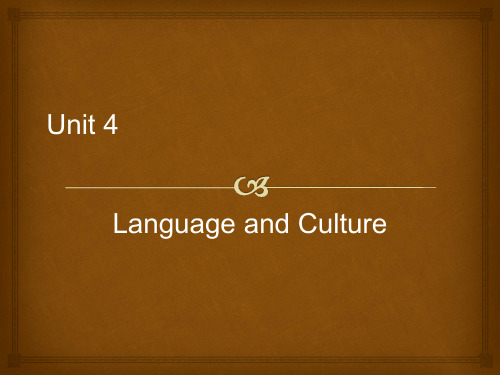
Reading I How Is Language Related to Culture
打落水狗, 斗鸡走狗, 狗恶 酒酸, 狗吠不惊, 狗急跳墙, 狗头军师, 狗血喷头, 狗眼 看人, 狗仗人势, 狗嘴里吐 不出象牙, 挂羊头、卖狗肉, 关门打狗, 狐朋狗友, 鸡鸣 狗吠, 嫁鸡随鸡、嫁狗随狗, 狼心狗肺, 鼠窃狗盗, 偷鸡 摸狗, 指鸡骂狗, 猪卑狗险, 狗皮膏药, 狗走狐淫, 丧家 之狗, 狗行狼心, 狗胆包女:你说你很寂寞,为什么不去找你以前的女朋友而来追我 呢? 男:好马不吃回头草!(A good horse will never turn round to graze on an old pasture.) 女:你们班上也有女孩呀!我们俩相隔这么远,为何来追我 呢? 男:兔子不吃窝边草!(A rabbit doesn„t nibble the grass near its own hole.) 女:那你现在为什么又要抛弃我呢?你这个混蛋! 男:天涯何处无芳草!(There are plenty of fish in the sea.)
“Language-and-culture” in the five dimensions of culture
Language and cultural products Language and cultural practices Language and cultural perspectives Language and cultural communities Language and persons
More examples
More examples
I am sorry. I am sorry, too. I am sorry three. What are you sorry for (four)? I am sorry five.
跨文化交际全部答案

跨文化交际全部答案(总30页) -CAL-FENGHAI.-(YICAI)-Company One1-CAL-本页仅作为文档封面,使用请直接删除参考资料Unit 1 Communication Across CulturesReading IIntercultural Communication:An Introduction Comprehension questions1. Is it still often the case that “everyone‟s quick to blame the alien” in the contemporary worldThis is still powerful in today‘s social and political rhetoric. For instance, it is notuncommon intoday‘s society to hear people say that most, if not all, of the social and economic problems arecaused by minorities and immigrants.2. What‟s the difference between today‟s intercultural contact and that of any time in the pastToday‘s intercultural encounters are far more numerous and of greater importancethan in anytime in history.3. What have made intercultural contact a very common phenomenon in our life todayNew technology, in the form of transportation and communication systems, has accelerated intercultural contact; innovative communication systems have encouraged and facilitated cultural interaction; globalization of the economy has brought people together; changes in immigration patterns have also contributed to intercultural encounter.4. How do you understand the sentence “culture is everything and everywhere”Culture supplies us with the answers to questions about what the world looks like and how we live and communicate within that world. Culture teaches us how to behave in our life from the instant of birth. It is omnipresent.5. What are the major elements that directly influence our perception and communicationThe three major socio-cultural elements that directly influence perception and communication are cultural values, worldview (religion), and social organizations (family and state).6. What does one‟s family teach him or her while he or she grows up in itThe family teaches the child what the world looks like and his or her place in thatworld.7. Why is it impossible to separate our use of language from our cultureBecause language is not only a form of preserving culture but also a means of sharing culture. Language is an organized, generally agreed-upon, learned symbol system that is used to represent the experiences within a cultural community.8. What are the nonverbal behaviors that people can attach meaning toPeople can attach meaning to nonverbal behaviors such as gestures, postures, facial expressions, eye contact and gaze, touch, etc.9. How can a free, culturally diverse society existA free, culturally diverse society can exist only if diversity is permitted to flourish without prejudice and discrimination, both of which harm all members of the society.Reading IIThe Challenge of GlobalizationComprehension questions1. Why does the author say that our understanding of the world has changedMany things, such as political changes and technological advances, have changed the world very rapidly. In the past most human beings were born, lived, and died within a limited geographical area, never encountering people of other cultural backgrounds. Such an existence, however, no longer prevails in the world. Thus, all people are faced with the challenge of understanding this changed and still fast changing world in which we live.2. What a “global village” is likeAs our world shrinks and its inhabitants become interdependent, people from remote cultures increasingly come into contact on a daily basis. In a ―global village‖, members of once isolated groups of people have to communicate with members of other cultural groups. Those people maylive thousands of miles away or right next door to each other.3. What is considered as the major driving force of the post-1945 globalizationTechnology, particularly telecommunications and computers are considered to be the major driving force.4. What does the author mean by saying that “the …global‟m ay be more local than the …local‟”The increasing global mobility of people and the impact of new electronic media on human communications make the world seem smaller. We may communicate more with people of other countries than with our neighbors, and we may be more informed of the international events than of the local events. In this sense, ―the ‗global‘ may be more local than the ‗local‘‖.5. Why is it important for businesspeople to know diverse cultures in the worldEffective communication may be the most important competitive advantage that firms have to meet diverse customer needs on a global basis. Succeeding in theglobal market today requires the ability to communicate sensitively with people from other cultures, a sensitivity that is based on an understanding of cross-culturaldifferences.6. What are the serious problems that countries throughout the world areconfronted withCountries throughout the world are confronted with serious problems such as volatile international economy, shrinking resources, mounting environmental contamination, and epidemics that know no boundaries.7. What implications can we draw from the case ofMichael FayThis case shows that in a world of international interdependence, the ability to understand and communicate effectively with people from other cultures takes on extreme urgency. If we are unaware of the significant role culture plays in communication, we may place the blame for communication failure on people of other cultures.8. What attitudes are favored by the author towardsglobalizationGlobalization, for better or for worse, has changed the world greatly. Whether we like it or not, globalization is all but unstoppable. It is already here to stay. It is both a fact and an opportunity. The challenges are not insurmountable. Solutions exist, and are waiting to be identified and implemented. From a globalistic point of view, there is hope and faith in humanity.Translation纵观历史,我们可以清楚地看到,人们由于彼此所处地域、意识形态、容貌服饰和行为举止上存在的差异,而长久无法互相理解、无法和睦相处。
跨文化交际课件Unit 4
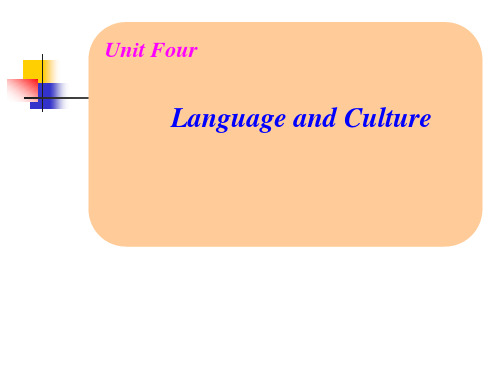
Language and Culture
A: Why couldn’t Cinderella be a good soccer player? B: She lost her shoe, she ran away from the ball, and her coach was a pumpkin.
references\一封信(colors).doc
Chinese Zodiac
mouse
ox
tiger
rabbit
dragon
snake
Chinese Zodiac
horse
sheep
monkey
rooster
dog
pig
Animal
mouse
Chinese
disgust, timid, dirty, smart and agile (敏捷)
tiger
ferocity(凶猛)
rabbit
dragon snake
cute and tameபைடு நூலகம்
majesty(威严;权威) harmful
lovely, reproductive (生殖、再生的)
evil evil
Animal
horse
Chinese
success/ devotion/ hardworking docile(温顺的) and
English
devotion/hardworking/ beauty, strength
sheep
monkey rooster dog pig
weak
clever, agile(机敏的) and a little impatient prostitute humble stupid, lazy, dirty
新编跨文化英语交际Unit4-01Language and Culture

2013-5-28
Unit4-01
18
Reading I How Is Language Related to Culture
• 2. What are the other functions of using question forms apart from asking for information? • It serves as a lubricant to move the conversation forward. Such a question can be called a "social question".
2013-5-28
Unit4-01
7
Warm Up
• • • • • • 2. A: I am sorry. Foreigner: I am sorry, too. A: I am sorry three. Foreigner: What are you sorry for (four)? A: I am sorry five.
2013-5-28 Unit4-01
3
1.The limits of my language are the limits of my world.
• 我语言的局限意味 着我的世界/天地的 局限. • 语言的限制就是我 世界里的限制 .
2013-5-28
Unit4-01
• Gozayimasuおはようございます
2013-5-28
Unit4-01
10
How to Say “Hello” in Different Languages
• • • • • Chinese: 你好, 您好 (formal) Hello – English Guten Tag – German Bonjour – French Hola – Spanish
跨文化交际--unit 4 language and culture
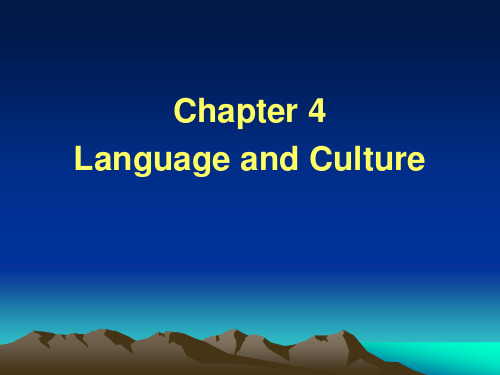
颜色词 Color Words
• White 白 – 包含white的其他习语: • the white area: an anti-revolutionary area 白区 • White Day: 白色情人节(3月14日) • white light district: ever-bright area • a white elephant: something burdensome and valueless; huge burden • show the white feather: show fear 露
颜色词 Color Wordsห้องสมุดไป่ตู้
• White 白 – 红人 • In Chinese, those who are popular and find favor with their bosses are called 红人. • In English, they are blue-eyed boys. – 白毛女 • white-haired girl
颜色词 Color Words
• White 白 – To most Chinese and Westerners, WHITE has certain similar connotations: purity, innocence, 洁白, 清白无辜.
颜色词 Color Words
• White 白 – white lie • a harmless lie 无恶意的谎言 – white man • 忠实可靠的人
颜色词 Color Words
• Red 红
– RED is the color associated with revolution and socialism (革命和社会主义). • 红卫兵 • The English word Red with a capital “R”, is often used as a synonym for a communist, usually in a derogatory sense. • 又红又专 both socialist minded and professionally qualified • 一颗红心 as loyal to the Party, having socialist virtues
Cross-CulturalCommunicationUnit1-4跨文化交际.ppt
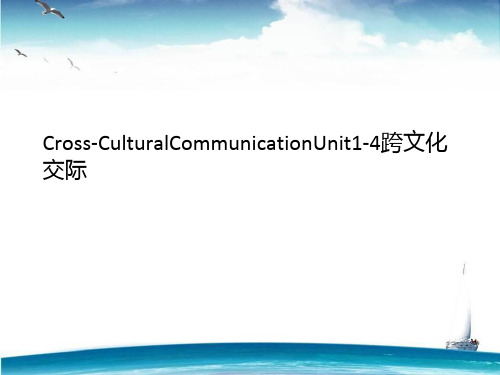
a) Each individual are unique. b) Stereotyping. c) Objectivity. d) Communication is not a Cure-all.
CHAPTER 1 - Communication and Culture: The Challenge of The Future
• Culture is – Transmitted from generation to generation – Learned – Shared – Based on symbols – Dynamic – An intergrated system
Cross-CulturalCommunicationUnit1-4跨文化 交际
CHAPTER 1
Communication and Culture: The Challenge of The Future
CHAPTER 1 - Communication and Culture: The Challenge of The Future
– increased the probability of survival
– satisfaction for the participants in an ecological niche
– share with those who could communicate with each other and lived in the same tCommunication:
Cross-CulturalCommunicationUnit1-4跨文化交际.ppt

CHAPTER 1 - Communication and Culture: The Challenge of The Future
Dominant Culture
Co-Cultures
• It's the one in power -
• They are numerous.
control.
• Distinct and unique
• We learned our culture through mass media
• Culture is transmitted from generation to generation
• Culture is based on symbols
• Culture is subjected to change
• Subjective elements include: values, beliefs, attitudes, orientations, and underlying assumptions prevalent among people in the society.
• Basic functions of Culture: adapt to a particular ecology, and includes the knowledge that people need to have in order to function in their own social environment.
• Culture is integrated
• Culture is adaptive
CHAPTER 1 - Communication and Culture: The Challenge of The Future
Cross-Cultural Communication Unit 1-4 跨文化交际

CHAPTER 1
Communication and Culture: The Challenge of The Future
CHAPTER 1 - Communication and Culture: The Challenge of The Future
This is called Globalization.
Globalization has greatly increased the economic strength of many nations and bring people together from different cultures. However, it could resulting more competition for natural resources, international conflicts and security, environmental issues, and world health issues.
❖ No Direct Mind-to-Mind Contact
❖ We can only Infer
❖ We seek to define the world
❖ Communication is self-Reflective
❖ The Brain is an open system - we learn to communicate
❖ Communication has a consequence
CHAPTER 1 - Communication and Culture: The Challenge of The Future
《新编跨文化交际英语教程》复习资料U4
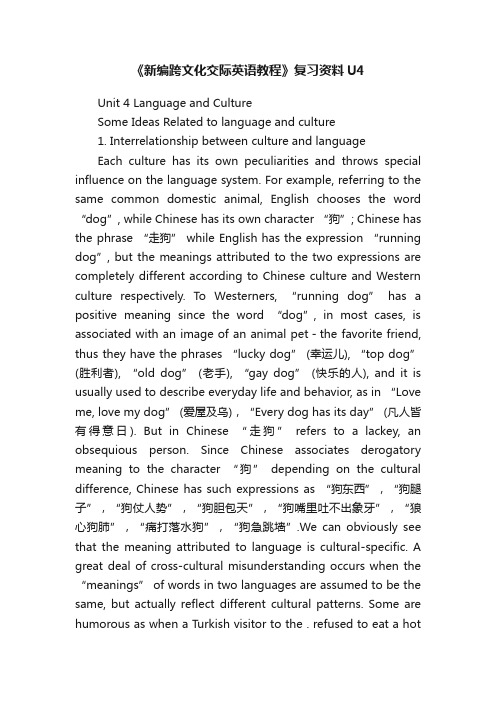
《新编跨文化交际英语教程》复习资料U4Unit 4 Language and CultureSome Ideas Related to language and culture1. Interrelationship between culture and languageEach culture has its own peculiarities and throws special influence on the language system. For example, referring to the same common domestic animal, English chooses the word “dog”, while Chinese has its own character “狗”; Chinese has the phrase “走狗” while English has the expression “running dog”, but the meanings attributed to the two expressions are completely different according to Chinese culture and Western culture respectively. To Westerners, “running dog” has a positive meaning since the word “dog”, in most cases, is associated with an image of an animal pet-the favorite friend, thus they have the phrases “lucky dog” (幸运儿), “top dog” (胜利者), “old dog” (老手), “gay dog” (快乐的人), and it is usually used to describe everyday life and behavior, as in “Love me, love my dog” (爱屋及乌),“Every dog has its day” (凡人皆有得意日). But in Chinese “走狗” refers to a lackey, an obsequious person. Since Chinese associates derogatory meaning to the character “狗” depending on the cultural difference, Chinese has such expressions as “狗东西”,“狗腿子”,“狗仗人势”,“狗胆包天”,“狗嘴里吐不出象牙”,“狼心狗肺”,“痛打落水狗”,“狗急跳墙”.We can obviously see that the meaning attributed to language is cultural-specific. A great deal of cross-cultural misunderstanding occurs when the “meanings” of words in two languages are assumed to be the same, but actually reflect different cultural patterns. Some are humorous as when a Turkish visitor to the . refused to eat a hotdog because it was against his beliefs to eat dog meat.Some are much more serious as when a French couple on a trip to China took their pet poodle into a restaurant and requested some dog food. The dog was cooked and returned to their table on a platter!We can summarize the relationship between culture and language as the following: language is a key component of culture. It is the primary medium for transmitting much of culture. Without language, culture would not be possible. Children learning their native language are learning their own culture; learning a second language also involves learning a second culture to varying degrees. On the other hand, language is influenced and shaped by culture. It reflects culture. Cultural differences are the most serious areas causing misunderstanding, unpleasantness and even conflict in cross-cultural communication.2. Sapir-Whorf HypothesisThe Sapir-Whorf theory, named after the American linguists Edward Sapir and Benjamin Lee Whorf, is a mould theory of language. Writing in 1929, Sapir argued in a classic passage that: `Human beings do not live in the objective world alone, nor alone in the world of social activity as ordinarily understood, but are very much at the mercy of theparticular language which has become the medium of expression for their society. It is quite an illusion to imagine that one adjusts to reality essentially without the use of language and that language is merely an incidental means of solving specific problems of communication or reflection. The fact of the matter is that the“real world” is to a large extent unconsciously built upon the language habits of the group. No two languages are ever sufficiently similar to be considered as representing the same social reality. The worlds in which different societies live are distinct worlds, not merely the same world with different labels attached... We see and hear and otherwise experience very largely as we do because the language habits of our community predispose certain choices of interpretation. (Sapir 1958 [1929], p. 69)This position was extended in the 1930s by his student Whorf, who, in another widely cited passage, declared that:We dissect nature along lines laid down by our native languages. The categories and types that we isolate from the world ofphenomena we do not find there because they stare every observer in the face; on the contrary, the world is presented in a kaleidoscopic flux of impressions which has to be organized by our minds — and this means largely by the linguistic systems in our minds. We cut nature up, organize it into concepts, and ascribe significances as we do, largely because we are parties to an agreement to organize it in this way —an agreement that holds throughout our speech community and is codified in the patterns of our language. The agreement is, of course, an implicit and unstated one, but its terms are absolutely obligatory; we cannot talk at all except by subscribing to the organization and classification of data which the agreement decrees. (Whorf 1940, pp. 213-14; his emphasis)3. The Role of Words in Various CulturesWords are inventive tools for communication, and the enjoyment of using this toolbox of symbols varies from cultureto culture. In low-context cultures, the role of words is of informational; meaning is encoded explicitly.Not to encode messages explicitly is to risk being misunderstood in those cultures. In high-context cultures the purpose of communication is often socially lubricative. That is, communication first has a role in sustaining relationships, and second only within the context of a relationship of transmitting information.4. The contrasts between Chinese and Western writing in English.~Reading IHow Is Language Related to Culture Comprehension questions1. What can we do to avoid attributing a very different meaning to the phrase or interpret it much more literally We have to be aware of the cultural implications of the phrase.2. What are the other functions of using question forms apart from asking for informationIt serves as a lubricant to move the conversation forward. A question that has this function can be called a ―social question.·3. Why are those Germans getting stiffer and more reserved all the time when visiting Ingrid ZerbeThey are confused about how to address her, for she introduces herself by first and last name rather than by last name and professional title.4. How does the environment influence the use of languageLanguage reflects the environment in which we live. We uselanguage to label the things that are around us.5. Does the author think there are exact equivalents in dictionaries that have the same meanings in different cultures No. According to the author, there are no such equivalents between languages; therefore, to communicate concepts effectively, cultural knowledge is as important as linguistic knowledge.6. How does the language change over time~Words and phrases that are used commonly at one time may be discontinued or their meaning may change over time.7. Does the author think it is possible for countries such as France and Iceland to keep their language pure by implementing language policy to ensure the use of standardized language The author does not think so, because, for instance, the Academie Francaise may insist on certain rules, but other French-speaking groups may make their own rules and consider their Frenchjust as correct.8. What are the possible language barriers in classroom teachingIn some cases the professors actually may have a poor command of the language; however, in most cases the problem is not the language but different intonation patterns and different cultural signals. .Reading IILanguage-and-Culture, Two Sides of the Same Coin@Comprehension questions1. What is the author?s view of the relationship between language and culture Language and culture are clearly fused; onereflects the other.2. In which ways does language reflect the cultureLanguage embodies the products, perspectives, communities, and persons of a culture. Members of the culture have created the language to carry out all theircultural practices, to identify and organize all their cultural products, and to name the underlying cultural perspectives in all the various communities that comprise their culture.3. How can we use the right language in the right way according to the authorIt is based on direct experience in the culture and interactions with members of the culture, in all the complexity this entails.》4. Is there any cultural product that consists entirely of language Can you give an exampleMany cultural products, such as literature, tax codes, telephone directories, operating instructions, passports, consist entirely of language. Another example is folklores.5. What is the meaning of “language is a cultural product in and of itself”When spoken and written, language takes on tangible and perceptible forms. These tangible forms, as with any cultural product, can be described through language. We constantly use language to discuss language itself.6. Can you give an example of how words lead to cultural perspectivesFor example, as we have already learned, the kinship terms specifically used in Chinese lead to a cultural perspective that is different from that of theEnglish-speaking people in this aspect.`7. What did the Chinese teacher find from her in-depth study of “the bumper sticker”The perspectives are indeed embodied in words, phrases, and sentences, but they are not always immediately obvious, especially to outsiders.8. Are there any particular norms made by different communities for their language useYes, there are. Communities define norms for appropriate use of language. Within groups, roles, relationships, and other social factors influence who speaks, what they say, and how they say it. The language forms we use in one set of social circumstances with certain communities are not necessarily the ones we use in others.Case StudyCase 13This example vividly illustrates that failures in intercultural translation may probably lead to very serious consequence, or even disasters to human beings. Definitely, translation is not such a simple process as rendering a word, a sentence or a text literally, but rather a far more complex one than most people assumed.For example, once a Chinese cosmetic manufacturer wanted to promote their products into the international market. The slogan of the advertisementwas: ―sweet as Jade, since in Chinese ―jade w as always employed to compliment woman‘s beauty; but unfortunately, it was not an appropriate word to describe thebeauty of a lady in Western cultures. In English, ―jade in its use of referring a woman had the connotations such as vulgar,rude, immoral, or skittish. Undoubtedly, the sales in【European countries were not satisfying.The seeming equivalents between languages may have very different connotations in different cultures, thus the translator should be cautious in the process of doing the translation so as to avoid misunderstandings.Case 14“杨” refers to Yang Kaihui w h o w a s Mao Zedong‘s deceased wife and ―柳‖ refers to Liu zhixun who was Li shuyi‘s deceased husband. They can be translated in different ways, but it seems to be very difficult, if not impossible, to achieve equivalence in translating from Chinese into English.Adopting the literal translation strategy, version 1 appears to be faithful to the original but may easily confuse the readers in the target language. Version 2 employs the liberal translation strategy with an attempt to convey the original meaning as precisely as possible. However, the original poetic flavor is lost as the rhetoric device — pun — is not reproduced.Case 15The translation seems to be faithful to the original, but it may not be really good for the purpose of intercultural communication. Foreign readers of the translation may find it strange and inappropriate.The following is what a friendly American journalist has commented on the translation:`My first reaction was unfortunately laughter because it is so full of mistakes. It omits some necessary information about the Dragon-Boat Festival, including its historical origins and when itactually takes place. These things are important… The copy seems to t ry to ―snow the reader with fanciful, overblown assertions about how terrific it all is, but in unintentionally hilarious language that leaves the reader laughing out uninformed… The brochure also suffers from lack of background material, the taking-if-for-granted that the reader already is familiar with many aspects of Chinese history and culture… It doesn‘t tell you where to go, how to get there, when things are open and closed, how much they cost, and so forth. All these are things people visiting an area want to know.Why is it that many Chinese travel guides read basically the same, no matter what region is being written about, and are so packed with indiscriminate hyperbole Less exaggeration would actually be more convincing.Case 16Comparing the two English versions, we can see th at in Yang‘s version more culturally-loaded meanings are conveyed from the original while Hawkes‘ version may be easier for English-speaking readers to comprehend.Look at some of the differences between the two versions of this extract:贾母The Lady Dowager / Grandmother Jia 老祖宗Old Ancestress / Granny dear凤辣子Fiery Phoenix / Peppercorn Feng二舅母王氏Lady Wang, her second uncle‘s wife / her Uncle Zheng‘s wife, Lady Wang:学名叫做王熙凤the school-room name His-feng / the somewhatboyish-sounding name of Wang Xi-feng黛玉忙赔笑见礼,以“嫂”呼之Tai-yu lost no time in greetingher with a smile as ―cousin.Dai-yu accordingly smiled and curt-eyed, greeting her by her correct name as she did so.竟不象老祖宗的外孙女儿She doesn‘t take after her father, son-in-law of our Old Ancestress /She doesn‘t take after your side of the family, Ganny.怨不得老祖宗天天嘴里心里放不下No wonder our Old Ancestress couldn‘t put you out of her mind and was forever talking and thinking about you. / I don‘t blame you for having gone on so about her during the past few days 现吃什么药What medicine are you taking / Not translatedAnd there are some culturally-loaded expressions in the text that seem to defy translation:琏二嫂子内侄女以“嫂”呼之外孙女儿嫡亲的孙女儿妹妹By comparing different translations of the same text, we can achieve a better understanding of cultural gaps and differences and then learn to employ proper strategies to bridge those gaps in translating across languages for intercultural communication.。
跨文化交际复习参考

How many Chinese words you can think of that are used to express communication?
交际、交流、传播、沟通
说了话, 对方懂了,这是交际,也是沟通。说了话,对 方莫名其妙,这不是沟通,只是交际—不产生效果或产生 反效果的交际。(王宗炎)
• Case 1
One cold winter day in a Chinese city, Wang Lin on his way to the library met an American professor who knew very little about China. After greeting him, Wang said: “It’s rather cold. You’d better put on more clothes.” But the professor didn’t appear happy on hearing this.
Unit 1 Communication Across Cultures
• Case Study
reference main points for case 2: in American culture, people tend to say what is on their minds and mean what they say. Mexican culture shares this preference of style with American culture in some situations. Korean people generally prefer indirect communication style, and they tend not to say what is on their minds and rely more on implications. In this case, to many Koreans, numerous questions would show a disrespect for the teacher, and would also reflect the student has not studies hard enough.
跨文化交际上课内容unit4
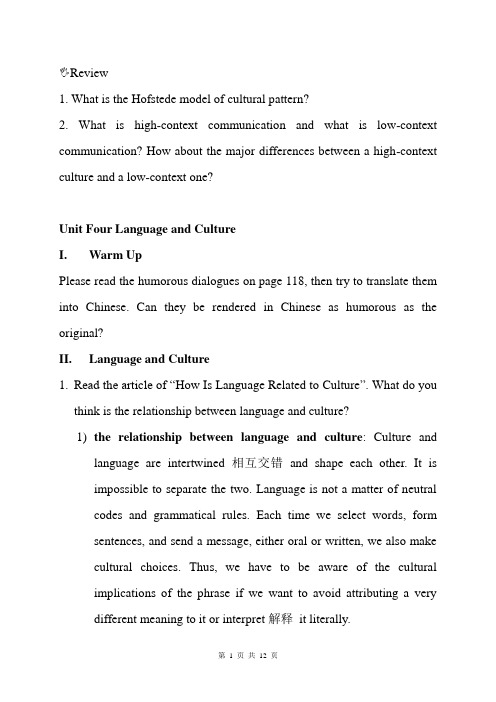
Review1. What is the Hofstede model of cultural pattern?2. What is high-context communication and what is low-context communication? How about the major differences between a high-context culture and a low-context one?Unit Four Language and CultureI.Warm UpPlease read the humorous dialogues on page 118, then try to translate them into Chinese. Can they be rendered in Chinese as humorous as the original?nguage and Culture1.Read the article of ―How Is Language Related to Culture‖. What do youthink is the relationship between language and culture?1)the relationship between language and culture: Culture andlanguage are intertwined相互交错and shape each other. It is impossible to separate the two. Language is not a matter of neutral codes and grammatical rules. Each time we select words, form sentences, and send a message, either oral or written, we also make cultural choices. Thus, we have to be aware of the cultural implications of the phrase if we want to avoid attributing a very different meaning to it or interpret解释it literally.2)Functions of language:e.g. questions: asking for information – information questionsa lubricant 润滑剂to move the conversation forward –social questionsExamples: How are you? 吃了吗?3)The meaning of the words comes out of the context, the culturalusage用法.①Language reflects the environment in which we live.Example: self-introduction of Germans and Americans②Language reflects cultural values.4)Problems:①There are no such equivalents between languages, and wetranslate concepts from a foreign language and culture with words that fit our priorities优先顺序. Therefore to communicate concepts effectively, cultural knowledge is as important as linguistic knowledge.Examples: manana/tomorrow kinship terms 亲属称谓(E &C)p125-126②Sometimes different cultures use identical完全相同words thathave rather different meanings.Examples: administration, director, force majeure5)Language changes over time. Words and phrases that are usedcommonly at one time may be discontinued or their meaning may change over time.6) A language, if spoken in different parts of the globe, ultimately willdevelop differently.Examples; pidgin Englishes2.Read the article of ―Language-and-Culture, Two Sides of the SameCoin‖. How does language reflect the culture?1)Language and culture are clearly fused混合; one reflects the other.2)Language-and-Culture: It is coined创造by Byram and Morgan in1994 in order to reflect the relationship between language and culture – both unification 同一and separation.3)Language embodies体现the products, perspectives, communities,and persons of a culture. Members of the culture have created the language to carry out all their cultural practices, to identify and organize all their cultural products, and to name the underlying cultural perspectives in all the various communities that comprise their culture.①Language and cultural products:Many cultural products – literature, tax codes, telephone directories, operating instructions, passports – consist entirely of language.Language is a cultural product in and of itself.②Language and cultural practices:Cultural practices almost always require language, the language of participation, such as speaking, listening, reading and writing.The social circumstances, the people involved, the topic, and a number of other factors influence the nature of the language used.③Language and cultural perspectives:We use language to name and understand the perceptions, values, attitudes, and beliefs that govern our way of life. Though language, we make tacit perspectives explicit.④Language and cultural communities:Communities develop distinct language to describe and carry out the particular practices and products associated with their group and its activities.⑤Language and persons:Language, like culture, is not only collective but also personal. Each of us uses language in an idiosyncratic manner, based upon our background, experiences, social groups, our personal outlook, and our identity.3.Conclusion:(i) Language and Environment1) Language is an instrument. Word differences are obvious in various languages. The relation between word and its meaning is arbitrary. For example, in Chinese, we live in a 房子. In English, we live in a house.2) Language is even more an environment. It has as much to do with the philosophical哲学的and political conditioning of a society as geography or climate. So, we can see that absolute color designations –white, black, red, yellow – are not merely inaccurate错误的不精确; they have become symbolic rather than descriptive.✐Homework: Finish the exercises on page 124, try to analyse the different perceptions of colour terms.1. green;2. brown;3. blue;4. white;5. black;6. yellow;7. green;8. red;9. black; 10. blue, blue; 11. white; 12. red; 13. blue; 14. green; 15. yellow. (ii) Language and Culture✐Homework: Sapir-Whorf Hypothesis (p146-149)Supplement: Word MeaningsWe know that words represent meaning. The problem is that they may represent several types of meanings simultaneously.(i) Denotation 符号and Connotation内涵What is denotation? What is connotation? Give examples to show their difference?(p126-127)(ii) Seven categories 类别of lexical meanings词汇意义The study of word meaning is lexical semantics词汇语义学. The lexical meanings could be classified into seven categories: conceptual meaning, connotative meaning, stylistic meaning, affective meaning, reflectedmeaning, collocative meaning and thematic meaning.1. Conceptual Meaning (概念意义)Words may refer to objects in the real world (e. g. dog, book, river, etc.) or abstract concepts (e. g. life, friendship, hatred, etc.) in our mind. The relationship between a word and an object in the real world or a concept in our mind to which the world refers is the conceptual meaning of the word.2. Connotative Meaning (内涵意义)It is the communicative value 交际价值an expression has in addition to the purely conceptual meaning. The word ―woman‖ can be defined conceptually as an adult female who is biped两足and has a womb子宫, which is the physical features of a woman. But several other psychological and social features can be attributed to her, such as ―capable of speech‖, ―experienced in cookery‖ and ―skirt or dress wearing‖. These additional features are its connotative meaning, which may include such features as ―frail‖脆弱的, ―prone to tears‖, ―emotional‖, etc. and such good qualities as ―gentle‖, ―compassionate‖慈悲, ―sensitive‖, ―hard-working‖, and so on.A high government official: (1) politician: engaging in polities for personal gain; (2) statesman政治家3. Social Meaning (社会意义)It is what a piece of language conveys 表达about the social circumstances of its use, which includes at least language users (who are using language), settings (where is language used), and topics (what are thelanguage users talking or writing about).家: (1) domicile: used in official or legal documents or between people who are involved in official or legal affairs. (2) residence: used in formal or administrative行政、管理的circumstances. (3) abode: a poetic诗意word, used in creation and appreciation of poems. (4) home: used in everyday speech between classmates, colleagues, friends or family members.4. Affective Meaning (情感意义)It is communicated when the feelings or attitudes are expressed in language. Such interjections感叹词as ―aha‖, ―my God‖, ―oh‖, and ―dear‖ are chiefly used to convey传达affective meaning.5. Reflected Meaning (反映意义)It arises in words of multiple多重的conceptual meaning, when one sense of a word forms part of our response to another sense. For example, ―the Comforter‖ and ―the Holy Ghost‖ both refer to God in religious English, but the former sounds warm and comforting, while the latter sounds awesome because these are the reflected meanings of these two terms.6.Collocative Meaning (搭配意义)It consists of association a word gets from those words that are often used together with it.Nice-looking : (1) pretty: girl, woman, flower, garden, color, village(2) handsome: boy, man, car, overcoat, airliner7. Thematic Meaning (主题意义)It is what is communicated by the way in which a speaker or writer organization a message, in terms of ordering, focus, or emphasis.e. g. the same conceptual content: (1) Mr. Smith donated the first prize.(2) The first prize was donated by Mr.Smith.The active sentence seems to be an answer to the question ―What did Mr. Smith donate?‖, while the passive sentence appears to answer ―Who was the first prize donated by?‖ or ―Who donated the first prize?‖. The active sentence suggests that we know who Mr. Smith is while the passive one does not.Meanings 2—7 are called associative meanings.关联意义nguage and Translation(i) Problems in translation to achieve equivalence between languages Please read over the article on pages 138-142, and answer the following question:How many types of equivalence in translation are mentioned?1. Lexical equivalence:2. Idiomatic[′ɪdi:ə`mætɪk] equivalence: like idioms3. Grammatical-syntactical equivalence:4. Experiential equivalence:5. Conceptual equivalence(ii) Words and Meaning1.W ords and Culture-specific 文化特异性Conceptual Meaning1)Words and geography: The Mississippi; the Channel; koala,kangaroo2)Words and history: The May Flower; scalp (剥带发头皮); lynch私刑; cowboy; hippie; duke; castle3)Words and politics: President; congress; Democratic Party民主党;Governor-General总督4)Words and Christianity: Trinity; Bible; Catholic; Protestant; Puritan5)Words and holidays: Christmas box (圣诞节礼); Christmastide (圣诞节节期); Easter6)Words and living styles: Hot dog; hamburger; pudding; cocktail;drive-ins (drive-in cinemas; drive-in banks; drive-in restaurants);motels, diners (餐车式饭馆); baseball (垒球), striptease (脱衣舞);love store (色情商店); late-late TV shows (深夜放映的色情电视片) 2.W ords with Partial局部的Equivalence1.young, middle-aged and oldEnglish: 18--------------40----------------60---------------Chinese: 18---------35--------------55----------------------2.intellectuals3.(1) social sciences: political science, economics, sociology, etc.,branches of learning that are concerned with human society, esp. its organization and the relationship of individual members to it.(1)社会科学: all the academic fields not included in the natural自然科学and applied sciences应用科学.2.(1) yard: a small open space completely or partially enclosed andadjoining 紧邻a building(2) 院子: 房屋前后用墙或栅栏围起来的空地.3.(1) d rugstore /a chemist’s shop: where medicines, toiletries化妆品, andvarious other small articles including food, are sold, but where one can buy only a few kinds of medicine without a prescription药方.(2)药店: where medicines and some kinds of medical apparatus医疗设备are sold, most of which are sold without a doctor’s prescription.4.kinship terms亲属称谓(p125-126)Summarize总结the major differences between English and Chinese kinship terms:3.W ords Often Mistakengreenhouse (温室) ≠绿色的房屋busywork (耗时又无价值的工作) ≠忙碌的工作busman’s hol iday (消磨于与日常工作类似之活动的假日)≠公共汽车驾驶员/乘务员的假日busybody (爱管闲事的人)≠大忙人housewarming (乔迁喜宴)≠房屋供暖donkeywork (苦役;单调的日常工作)≠驴活儿police action (未经正式宣战,对破坏国际和平与秩序的叛乱者采取的镇压行动)≠警察行动lowbody (矮脚抽屉柜)≠矮个子男孩free love (公开同居)≠自由恋爱equalitarianism (favorable term)≠平均主义disinterested (公正的)≠无兴趣wester (西风)≠西方人first lady; high school; lover; restroom4.W ords and Connotative Meanings1)dog and狗(p127)2)peasant and农民3)landlord and地主4)comrade and同志5)self-made man (successful persons from humble origin) and 白手起家的人(经济基础不是很好)6)propaganda and宣传7)do-gooder (stupid persons earnestly bent on doing good withoutknowing the harmful result) and作好事的人8)spiritual (religious connotation) and 精神的IV.Case Study: Students are required to read the cases given carefully and try to analyse them from the viewpoint of IC.。
外研社教学课件跨文化国际传播英语教程 U4-1

外研社教学课件跨文化国际传播英语教程 U4-1本文档旨在简要介绍《外研社教学课件跨文化国际传播英语教程 U4-1》的背景、适用对象和教学目标等内容。
课程结构本文档旨在简要介绍《外研社教学课件跨文化国际传播英语教程U4-1》的背景、适用对象和教学目标等内容。
课程结构本教学课件是《外研社教学课件跨文化国际传播英语教程 U4-1》的课程结构说明。
课程分为多个单元,每个单元都包含特定的主题和教学内容。
以下是每个单元的简要说明:本教学课件是《外研社教学课件跨文化国际传播英语教程 U4-1》的课程结构说明。
课程分为多个单元,每个单元都包含特定的主题和教学内容。
以下是每个单元的简要说明:单元一:全球化主题:全球化的概念和影响教学内容:全球化的定义,全球化对文化、经济、政治以及环境的影响,全球化背后的驱动因素。
单元二:跨文化传播主题:跨文化交流和传播的挑战与机遇教学内容:跨文化交流的重要性,跨文化传播的障碍与解决策略,跨文化传播中的误解与误解的解决方法。
单元三:语言与文化主题:语言和文化之间的关系教学内容:语言与文化的相互影响,语言在跨文化传播中的作用,语言在文化认同和身份上的重要性。
单元四:文化差异主题:不同文化之间的差异和冲突教学内容:不同文化之间的价值观、、俗的差异,文化冲突的原因与解决方法。
单元五:国际商务沟通主题:国际商务沟通的特点和技巧教学内容:国际商务沟通的挑战,跨文化商务交流的技巧与策略,有效解决国际商务沟通中的问题。
以上是《外研社教学课件跨文化国际传播英语教程 U4-1》的课程结构简要说明,每个单元都涉及不同的主题和教学内容,以便帮助学生更好地理解和应对跨文化国际传播的挑战。
本文介绍了教师在教授《外研社教学课件跨文化国际传播英语教程 U4-1》时可以采用的教学方法。
以下是一些教学方法的概述:综合训练:教师可以采用综合训练的方式来帮助学生提高听说读写的能力。
通过结合不同的语言活动,如听力练、口语训练、阅读理解和写作练,学生可以全面提升语言技能。
Unit 4 Language and Culture
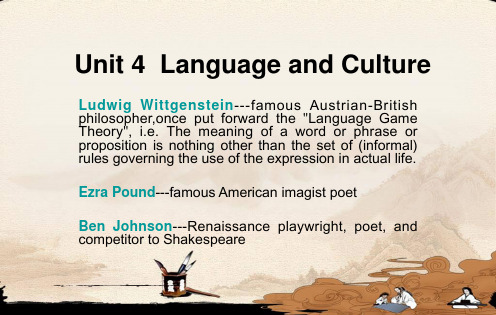
布朗先生是一位忠实可靠的人。那天他脸色不好,近来 感到闷闷不乐。我见到他时,他显得心事重重。我希望他 早点振作起来。
Continued
Red (1) • 红旗 red flag 红糖 brown sugar 红茶 black tea 红榜 honor roll • 红豆 love pea 红运 good luck 红利 dividend 红事 wedding • 红葡萄酒 red wine 火灾 red ruin 血战 red battle 彩霞 red sky • 隆重的 /上宾待遇的 red-carpet 修改 / 检查/ 删除 red-pencil • 货运快车/铁路特快货车 red ball(俚) 一分钱 / 毫厘(口) red cent • 真金/金钱(古) red gold • Red (2) • 贾宝玉神游太虚境,警幻仙曲演红楼梦。 • Jiao Baoyu visits the Land of Illusion; • And the fairy Disenchantment performs the Dream of Golden Days. • 贾宝玉品茶栊翠庵,刘姥姥醉窝怡红院。 • Jia Baoyu tastes some superior tea at Green Bower Hermitage; And Grannie Liu samples the sleeping accommodation at Green Delights. •
某人无奈,道:I am sorry five.
Continued
6. Patient: Well, doctor, my nose runs and my feet smell. Doctor: Hummm, that's awkward. You'Байду номын сангаасe built upside-down. 7. Policeman: Your dog keeps chasing a man on a bicycle. Man: Nonsense, officer. My dog can't ride a bicycle. 8. 7 days, without 7-Up, makes one weak(week). 9. What sentence is the longest in the world? 10. Which part of the clock is always old?
- 1、下载文档前请自行甄别文档内容的完整性,平台不提供额外的编辑、内容补充、找答案等附加服务。
- 2、"仅部分预览"的文档,不可在线预览部分如存在完整性等问题,可反馈申请退款(可完整预览的文档不适用该条件!)。
- 3、如文档侵犯您的权益,请联系客服反馈,我们会尽快为您处理(人工客服工作时间:9:00-18:30)。
3
1.The limits of my language are the limits of my world.
• 我语言的局限意味 着我的世界/天地的 局限. • 语言的限制就是我 世界里的限制 .
2013-5-28
Unit4-01
• Gozayimasuおはようございます
2013-5-28
Unit4-01
10
How to Say “Hello” in Different Languages
• • • • • Chinese: 你好, 您好 (formal) Hello – English Guten Tag – German Bonjour – French Hola – Spanish
2013-5-28
Unit4-01
8
Warm Up
• 2. • A. Why couldn’t Cinderella be a good soccer player? • B. She lost her shoe, she ran away from the ball, and her coach was a pumpkin.
2013-5-28
Unit4-01
13
Saying “thank you”
• • • •
• • • •
English: Thank You German: Danke (schö - (dahn-kuh (shurn) n) Spanish: Gracias Japanese:ありがとうございます arigato gozaimasu [pronounced: A-rii-gah-to' goh-zaemas] (formal) Korean:감사합니다Gomapsupnida (formal ) [pronounced: go-mahp-soop-nee-dah] Korean:고마워요/고맙습니다 Komapsumnida Russian: Спасибо (sounds like spa-see-ba)
2013-5-28 Unit4-01
2
1.The limits of my language are the limits of my world.
• Language is the communication of meaning between anything in anyway. So for that to be narrowed or limited is to also limit your understanding of the world around you. basically keep an open mind. • 我语言的局限意味着我的世界/天地的局限. • 语言的限制就是我世界里的限制 .
2013-5-28
Unit4-01
16
• 7. Does the author think it possible for countries such as France and Iceland to keep their languages pure by implementing language policies? • 8. What are the possible language barriers in classroom teaching?
Unit 4-01
Language and Culture
Warm Up
• 1.The limits of my language are the limits of my world. • 2.The sum of human wisdom is not contained in any one language, and no single language is capable of expressing all forms and degrees of human comprehension. • nguage most shows a man. Speak, that I may see thee.
2013-5-28
Ug I How Is Language Related to Culture
• • • • • How to Say “Hello” in Different Languages? Hello Guten Tag, Bonjour, or Ohio
4
• 2.The sum of human wisdom is not contained in any one language, and no single language is capable of expressing all forms and degrees of human comprehension. • Ezra Pound (1885-1972) • 任何一种语言都无法包含人类智慧的结晶的总和, 任何单一的语言都无法表达人的认知的所有形式 和程度. -----庞德,诗人( 1885年至1972年)
• Ohio – Japanese おはよう • Gozayimasu- Japaneseおはようございます
2013-5-28 Unit4-01
11
How to Say “Hello” in Different Languages
• Japanese: おはようございます (ohayō gozaimá = good morning, polite), こんにち su は (kó nnichi wa = good day), こんばんは (kó mban wa = good evening), おはよう (ohayō = hello • Korean: 안녕하세요 (annyeonghaseyo, formal), 안녕 (annyeong, informal) Russian: привет (privé informal), t, здравствуйте (zdrá vstvujte, formal), добрый день (dóbryj den’)
2013-5-28
Unit4-01
5
• nguage most shows a man. Speak, that I may see thee. • 语言最能显示一个人,说话吧,让我看看你的真 面目. • 语言最能表现一个人。一开口说话,就可以看出 来。 • 意思是一个人所讲的话可以反映出他的品格。这 很好理解,像有的人说话尖刻不饶人,那他就是 毒舌派,如果有的人讲话喋喋不休,那他就是长 舌妇。。。总之,听别人说话,可以帮助你判断 他可信可敬的程度。
2013-5-28
Unit4-01
17
Reading I How Is Language Related to Culture
• 1. What can we do to avoid attributing a very different meaning to a phrase or interpret it literally? • We have to be aware of the cultural implications of the phrase.
2013-5-28 Unit4-01
12
How to Say “Hello” in Different Languages
• • • • • • •
English: goodbye Italian: ciao bella French: au revoir Spanish: adios Russian: Довиждане (dasvidania) German: auf wiedersen Japanese:さよなら (Sayonara ) Korean: 안녕히 계세요 (Annyeonghi gyeseyo)
2013-5-28
Unit4-01
6
Warm Up
• • • • •
(P118.)
1.[In a physics class] Professor: What is matter? Student: Never mind. Professor : Then what is mind? Student: It doesn’t matter.
2013-5-28 Unit4-01
15
• 4. What is the relationship between environment and language? • 5. Does the author think there are exact equivalents in dictionaries that have the same meanings in different cultures? • 6. How does language change over time?
2013-5-28
Unit4-01
18
Reading I How Is Language Related to Culture
• 2. What are the other functions of using question forms apart from asking for information? • It serves as a lubricant to move the conversation forward. Such a question can be called a "social question".
2013-5-28
Unit4-01
7
Warm Up
• • • • • • 2. A: I am sorry. Foreigner: I am sorry, too. A: I am sorry three. Foreigner: What are you sorry for (four)? A: I am sorry five.
